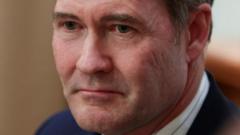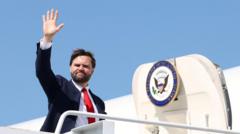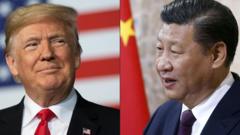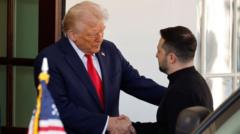In a major reevaluation of his administration's national security strategy, President Trump has removed Michael Waltz from his role as national security adviser and nominated him for a U.N. ambassador position. Secretary of State Marco Rubio will temporarily fill both roles, leading to questions regarding future decisions on critical foreign policy issues.
Trump Restructures National Security Team Amid Shifting Geopolitical Landscape

Trump Restructures National Security Team Amid Shifting Geopolitical Landscape
President Trump announces significant changes within his national security team, appointing Secretary of State Marco Rubio as interim national security adviser while nominating Michael Waltz as ambassador to the U.N.
In a surprising turn of events, President Trump has announced the removal of his national security adviser, Michael Waltz, and appointed Secretary of State Marco Rubio as the interim replacement, while nominating Waltz for the role of ambassador to the United Nations. This change marks a significant personnel overhaul in the administration, notably in a second term when such adjustments are often avoided.
Waltz's removal appears to stem from an incident where he unintentionally included a journalist in a sensitive communication regarding military operations in Yemen on the messaging platform Signal. Nevertheless, it seems Waltz's tenure was precarious even prior to this mishap, as Trump's aides had described him as overly hawkish for a president keen on negotiating a nuclear agreement with Iran and fostering relations with Russia.
Rubio's dual role as Secretary of State and acting national security adviser invokes historical comparisons, reminiscent of how Henry Kissinger held similar titles during the Nixon and Ford presidencies. Observers are keenly watching how this consolidation of power plays out, especially given the current contentious climate regarding international relations with major powers like China, Russia, and Iran.
In related developments, various Trump-backed initiatives are underway, such as a $2 billion venture involving digital currencies connected to the Trump family's cryptocurrency efforts. Additionally, within the presidency's initial 100 days, comments from influential figures like Elon Musk suggest a reevaluation of budget strategies and radiate uncertainty regarding Trump's international strategies.
Critics have also highlighted controversies surrounding the administration’s legal maneuvers, including pushbacks against demands for criminal investigations related to protests in Colombia and a federal court ruling declaring the deportation of Venezuelans under an outdated law as illegitimate.
As the reshuffle unfolds, the choice of the next national security adviser looms large, indicating potential shifts in U.S. foreign policy and responses to emerging global challenges.
Waltz's removal appears to stem from an incident where he unintentionally included a journalist in a sensitive communication regarding military operations in Yemen on the messaging platform Signal. Nevertheless, it seems Waltz's tenure was precarious even prior to this mishap, as Trump's aides had described him as overly hawkish for a president keen on negotiating a nuclear agreement with Iran and fostering relations with Russia.
Rubio's dual role as Secretary of State and acting national security adviser invokes historical comparisons, reminiscent of how Henry Kissinger held similar titles during the Nixon and Ford presidencies. Observers are keenly watching how this consolidation of power plays out, especially given the current contentious climate regarding international relations with major powers like China, Russia, and Iran.
In related developments, various Trump-backed initiatives are underway, such as a $2 billion venture involving digital currencies connected to the Trump family's cryptocurrency efforts. Additionally, within the presidency's initial 100 days, comments from influential figures like Elon Musk suggest a reevaluation of budget strategies and radiate uncertainty regarding Trump's international strategies.
Critics have also highlighted controversies surrounding the administration’s legal maneuvers, including pushbacks against demands for criminal investigations related to protests in Colombia and a federal court ruling declaring the deportation of Venezuelans under an outdated law as illegitimate.
As the reshuffle unfolds, the choice of the next national security adviser looms large, indicating potential shifts in U.S. foreign policy and responses to emerging global challenges.




















